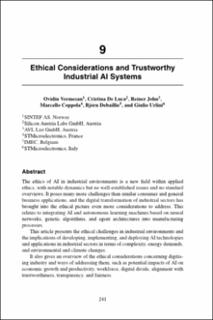| dc.contributor.author | Vermesan, Ovidiu | |
| dc.contributor.author | De Luca, Cristina | |
| dc.contributor.author | John, Reiner | |
| dc.contributor.author | Coppola, Marcello | |
| dc.contributor.author | Debaillie, Björn | |
| dc.contributor.author | Urlini, Giulio | |
| dc.date.accessioned | 2023-08-31T15:41:58Z | |
| dc.date.available | 2023-08-31T15:41:58Z | |
| dc.date.created | 2022-10-05T16:09:36Z | |
| dc.date.issued | 2022 | |
| dc.identifier.citation | Intelligent Edge-Embedded Technologies for Digitising Industry. 2022, chapter 9, 241-269. | en_US |
| dc.identifier.isbn | 9788770226110 | |
| dc.identifier.uri | https://hdl.handle.net/11250/3086687 | |
| dc.description.abstract | The ethics of AI in industrial environments is a new field within applied ethics, with notable dynamics but no well-established issues and no standard overviews. It poses many more challenges than similar consumer and general business applications, and the digital transformation of industrial sectors has brought into the ethical picture even more considerations to address. This relates to integrating AI and autonomous learning machines based on neural networks, genetic algorithms, and agent architectures into manufacturing processes.
This article presents the ethical challenges in industrial environments and the implications of developing, implementing, and deploying AI technologies and applications in industrial sectors in terms of complexity, energy demands, and environmental and climate changes.
It also gives an overview of the ethical considerations concerning digitising industry and ways of addressing them, such as potential impacts of AI on economic growth and productivity, workforce, digital divide, alignment with trustworthiness, transparency, and fairness.
Additionally, potential issues concerning the concentration of AI technology within only a few companies, human-machine relationships, and behavioural and operational misconduct involving AI are examined.
Manufacturers, designers, owners, and operators of AI—as part of autonomy and autonomous industrial systems—can be held responsible if harm is caused. Therefore, the need for accountability is also addressed, particularly related to industrial applications with non-functional requirements such as safety, security, reliability, and maintainability supporting the means of AI-based technologies and applications to be auditable via an assessment either internally or by a third party. This requires new standards and certification schemes that allow AI systems to be assessed objectively for compliance and results to be repeatable and reproducible.
This article is based on work, findings, and many discussions within the context of the AI4DI project. | en_US |
| dc.language.iso | eng | en_US |
| dc.publisher | River Publishers | en_US |
| dc.relation.ispartof | Intelligent Edge-Embedded Technologies for Digitising Industry | |
| dc.relation.uri | https://www.riverpublishers.com/pdf/ebook/chapter/RP_9788770226103C9.pdf | |
| dc.rights | Navngivelse-Ikkekommersiell 4.0 Internasjonal | * |
| dc.rights.uri | http://creativecommons.org/licenses/by-nc/4.0/deed.no | * |
| dc.title | Ethical Considerations and Trustworthy Industrial AI Systems | en_US |
| dc.title.alternative | Ethical Considerations and Trustworthy Industrial AI Systems | en_US |
| dc.type | Chapter | en_US |
| dc.description.version | publishedVersion | en_US |
| dc.rights.holder | © The Editor(s) (if applicable) and The Author(s) 2022. This book is published open access. | en_US |
| dc.source.pagenumber | 241-269 | en_US |
| dc.identifier.doi | 10.13052/rp-9788770226103 | |
| dc.identifier.cristin | 2058913 | |
| dc.relation.project | Norges forskningsråd: 318863 | en_US |
| dc.relation.project | Norges forskningsråd: 329051 | en_US |
| dc.relation.project | Norges forskningsråd: 308908 | en_US |
| dc.relation.project | EC/H2020/826060 | en_US |
| dc.relation.project | EC/H2020/101007326 | en_US |
| dc.relation.project | EC/H2020/877539 | en_US |
| cristin.ispublished | true | |
| cristin.fulltext | original | |
| cristin.qualitycode | 1 | |

